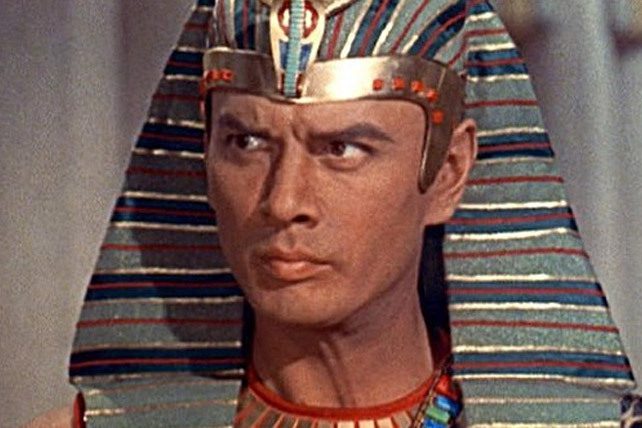By Jessica Lea March 1, 2023

“Did Pharaoh have free will when ‘God hardened his heart’?” was a question apologist Mike Winger explored yesterday on his YouTube channel. The question touches on the troubling thought that God could be causing the very problem for which he is holding people responsible.
RELATED: Should Worship Leaders Wear Yoga Pants? Mike Winger Shares His Thoughts
Mike Winger Looks at Pharaoh’s Response to God
Mike Winger is a pastor who runs the ministry, BibleThinker, where he seeks to help people evaluate different areas of life based on Scripture. One of his followers asked a question about Exodus 9:12, which says, “But the LORD hardened Pharaoh’s heart and he would not listen to Moses and Aaron, just as the LORD had said to Moses.”
“Did Pharaoh have free will?” the person wanted to know.
Winger first pointed out the importance of taking information in context. Sometimes, he said, he will hear a statement from someone on social media and make a wrong assumption about their beliefs. Later, he realizes that their teaching is solid after he understands the context for what they said. In the same way, it is important to take Exodus 9:12 in context.
The first part of the Book of Exodus describes the plight of God’s chosen people, the nation of Israel, as slaves in Egypt. When the Israelites cry out to God to save them from their oppression, he sends Moses to confront Pharaoh, the ruler of the Egyptians, and to say that God commands him to let the Israelites go. When Pharaoh repeatedly refuses to do so, God sends a series of 10 plagues on Egypt until Pharaoh finally acquiesces. Exodus 7:1-4 says:
Then the LORD said to Moses, “See, I have made you like God to Pharaoh, and your brother Aaron will be your prophet. You are to say everything I command you, and your brother Aaron is to tell Pharaoh to let the Israelites go out of his country. But I will harden Pharaoh’s heart, and though I multiply my signs and wonders in Egypt, he will not listen to you. Then I will lay my hand on Egypt and with mighty acts of judgment I will bring out my divisions, my people the Israelites.
Mike Winger pointed out that there are several times apart from Exodus 9:12 when the writer of Exodus refers to Pharaoh’s heart hardening. Exodus 7:13 says, “Yet Pharaoh’s heart became hard and he would not listen to them, just as the LORD had said.”
In this example, Pharaoh’s heart is becoming hard on its own apart from any act on the part of God. “This is important to recognize,” said Winger, “because this matters when we understand the ‘causal nature’ of what happened to Pharaoh’s heart.”
Exodus 7:14 continues, “Then the LORD said to Moses, ‘Pharaoh’s heart is unyielding; he refuses to let the people go.” Again, said Winger, “his heart grew hard on its own in this case, in this particular situation.”
In Exodus 7, Pharaoh is responding to signs that God is performing through Moses. First, Aaron’s staff turns into a snake, and then water turns into blood, the first plague. Verse 22 of that same chapter makes a previous statement once again: “Pharaoh’s heart became hard.”
“Again, it’s not God as the agent here,” said Winger, pointing out that the text could have, but does not, say that God hardened Pharaoh’s heart in these instances.
Similarly, Exodus 8:19 says, “Pharaoh’s heart was hard,” or “grew hard” in Winger’s translation, once again not showing God as the cause of what is happening.
Another example occurs after God sends the plague of pestilence on livestock, killing the livestock of the Egyptians. Exodus 9:7 says, “Pharaoh investigated and found that not even one of the animals of the Israelites had died. Yet his heart was unyielding and he would not let the people go.”
Then, verse 12 says that God was the one who hardened Pharaoh’s heart.
“What are we getting from this?” asked Winger. “That it’s not just a single action on behalf of God.”
First, Pharaoh hardened his heart on his own in response to the miracles and signs that God was doing. He repeatedly rejected God, despite the supernatural works God performed in front of him. “Pharaoh is active in the hardening of his own heart,” said Winger. “This is key. This is very important.”
“There are people who are, because of their own sinful attitudes, they’re disposed against God,” said the Bible teacher. “And God shows them miracles, God shows them light, God gives them truth, and because of their attitudes, they reject the light, they close their eyes to the truth, and they become harder. So God, by showing them himself in glory, effectively hardens their hearts because they are wicked.”
Winger compared what he is describing to when he was a child and recognized when his parents were likely to say no if he were to ask them for something that he wanted at that particular moment. Asking at that time was only likely to make them more hardened against his wishes.
What God did to Pharaoh is also similar, said Winger, to what Jesus did when he performed miracles in front of the Pharisees and they rejected him. Jesus’ actions actually soften the hearts of people who are open to God, but harden the hearts of people who are not.
“God’s not hardening [Pharaoh’s] heart by doing heart surgery,” said Winger. “He’s hardening his heart by confronting wicked Pharaoh with light.”

Thank you for explaining that. That is something I could never understand.
LikeLiked by 1 person
You’re welcome to His Glory.
It was a good question in my mind for the longest time.
LikeLiked by 1 person